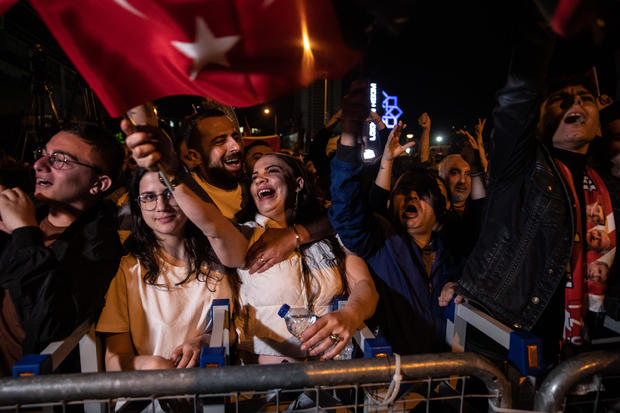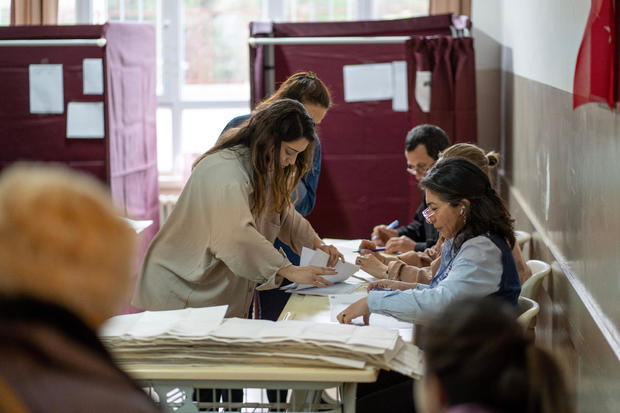Be back soon Turkish national elections President Recep Tayyip Erdogan held a solid lead on Sunday after nearly 47% of ballot boxes were counted, Turkey’s state-run news agency said, while the longtime leader’s main rival disputed the numbers showing him behind.
Erdogan, who has ruled NATO member Turkey as prime minister or president for two decades, won 52.2% of the vote from a partial count, while opposition leader Kemal Kilicdaroglu got 41.9%, Anadolu Agency said.
In the run-up to the election, opinion polls indicated that the increasingly authoritarian Erdogan narrowly trailed his rival. The contest, which has largely focused on domestic issues such as the economy, civil rights and the February earthquake that killed more than 50,000 people, has emerged as the toughest re-election bid of the Turkish leader’s 20-year rule.
Erdogan was lauded in his first decade as a leader for transforming Turkey into an economic and political success story, but in the past 10 years he has faced increasing criticism – domestically and internationally – for quashing dissent. Accepting the general rules and laws of autocratic rule.
Once the poster child for developing countries, Turkey is currently struggling with high inflation and a cost-of-living crisis, both of which are regularly blamed by opponents and economists for Erdogan’s unorthodox economic policies.
BK/Getty Images
Erdogan’s main challenger, İkıkdaroğlu, is a secular social democratic politician who has emphasized a message of freedom and democracy on the campaign trail. The opposition coalition he represents has pledged to roll back constitutional changes introduced after a 2017 referendum. Significantly expanded the powers of the Presidentand bringing back the parliamentary system.
With partial results showing otherwise, members of Kilikdaroglu’s center-left, secular Republican People’s Party, or CHP, disputed the numbers from Anadolu, the state-run body biased in favor of Erdoğan.
“We are ahead,” tweeted Kilicdaroglu, 74, who ran as a candidate for the six-party opposition coalition.
The election could grant the 69-year-old Erdogan another five-year term or oust Kilicdaroglu. If no candidate receives more than 50% of the vote, the winner will be determined by a run-off on May 28.
Voters also elected lawmakers to fill Turkey’s 600-seat parliament, which lost its legislative powers after Erdogan became executive president. The opposition has promised to return Turkey’s system of governance to a parliamentary democracy if they win both the presidential and parliamentary ballots.
More than 64 million people were eligible to vote, including 3.4 million overseas voters. This year marks 100 years since the founding of Turkey as a republic — a modern, secular state born on the ashes of the Ottoman Empire.
Voter turnout in Turkey is traditionally strong, but the government has cracked down on freedom of expression and assembly since a 2016 coup attempt. Erdogan blamed followers of cleric Fethullah Gulen, a former ally, for the failed coup and launched a large-scale crackdown on civil servants accused of ties to Gulen and pro-Kurdish politicians.
Internationally, the elections were seen as a test of a united opposition’s ability to oust a leader who has concentrated almost all state power in his hands and worked to gain more influence on the world stage.
Erdogan, along with the United Nations, helped broker an agreement with Ukraine and Russia that allowed Ukrainian grain from Black Sea ports to reach the rest of the world despite Russia’s war in Ukraine. The deal is due to expire in a few days and Turkey held talks last week to keep it alive.
The war in Ukraine prompted Finland and Sweden to seek NATO membership as a safeguard against possible Russian aggression. But Erdogan has maintained Sweden’s membership in the alliance and demanded concessions, claiming the nation has been too soft on US-based clerics and members of pro-Kurdish groups that Turkey considers a national security threat.
Critics maintain that the president’s heavy-handed style is responsible for a painful spending crisis. Inflation is around 44% in the latest official figures, down from a high of around 86%. Vegetable prices became a campaign issue for the opposition, who used the onion as a symbol.
Bloomberg
Contrary to mainstream economic thinking, Erdogan has claimed that high interest rates fuel inflation, and he has repeatedly pressured Turkey’s central bank to cut its key rate.
Erdogan’s government has also faced criticism for a delayed and stagnant response to the 7.8-magnitude earthquake that devastated 11 southern provinces. A lax implementation of building codes is believed to have increased casualties and distress.
In his election campaign, Erdogan used state resources and his dominant position over the media to woo voters. He accused the opposition of colluding with “terrorists” to get “drunk” and uphold LGBTQ+ rights, which he portrayed as a threat to traditional family values in the predominantly Muslim nation.
To ensure support from citizens hit by inflation, he raised wages and pensions and subsidized electricity and gas bills while showcasing Turkey’s domestic defense and infrastructure projects.
Kilikdaroglu’s six-party Nation Alliance has pledged to dismantle the executive presidency system, restore the independence of the judiciary and the central bank, and resist crackdowns on free speech and other democratic retreats in Turkey.
At the polling station, many voters had to try to fold the heavy ballot paper – they have 24 political parties vying for seats in parliament – and fit the envelope with the ballot for the president.
“It’s important for Turkey. It’s important for the people,” said Necati Aktuna, a voter in Ankara. “I’ve been voting for 60 years. I’ve never seen a more important election.”
“We all miss democracy so much. We all miss being together,” Kilicdaroglu said after voting at a school in Ankara, where his supporters chanted “President Kilicdaroglu!”
Also running for president is Sinan Ogan, a former academic who has the backing of an anti-immigrant nationalist party.
About 9 million people were eligible to vote in the 11 provinces affected by the earthquake. About 3 million people left the earthquake zone and moved to other provinces, but only 133,000 people registered to vote in their new location.
Erdogan said the vote went ahead “without any problems”, including in earthquake-ravaged provinces.
“It is my hope that after the evening count … there will be a better future for our country, our nation and Turkish democracy,” Erdogan said.
In Diyarbakir, a Kurdish-majority city that was hit by the earthquake, Ramazan arrived early at his polling station to cast his vote in Akka.
He said, ‘There will be a democratic election by God’s will. “May the name of our country prosper.”


